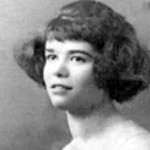Top Qs
Timeline
Chat
Perspective
Marian Arkwright
English composer From Wikipedia, the free encyclopedia
Remove ads
Marian Ursula Arkwright (25 January 1863 – 23 March 1922) was an English composer, pianist and string player (viola and double bass). She was one of the first women in England to earn a Bachelor of Music degree (in 1895), and the first woman to earn a doctorate in music, which she gained in 1913. Arkwright worked as an orchestral musician, composer and conductor, and received a prize for an orchestral work from The Gentlewoman.[1]

Remove ads
Life
Summarize
Perspective
Marian Arkwright was born in Norwich, Norfolk, England on 25 January 1863,[2] a descendent of Richard Arkwright, the inventor of the Spinning Jenny.[3] Her brother was the musicologist Godfrey Edward Pellew Arkwright.[4]
Arkwright studied piano with Bernhard Althaus (1831-1917) and also took piano lessons from Charles Hallé.[5] She also studied double bass with Charles Henry Winterbottom and composition with J.S. Liddle, organist at Newbury. She was awarded the L.R.A.M. in 1891, earned a Bachelor of Arts in music at Durham University in 1895, and a doctorate in music at the same university in 1913,[6][2] making her the first English woman to gain a PhD in music.[7][8]
After completing her studies, she worked as an orchestral musician and composer and conducted orchestras including the Newbury Amateur Orchestral Society.[6] She served as secretary of the English Ladies' Orchestral Society and the Highclere Choral Society, and was a leader of the Rural Music Schools movement.[9]
In 1906 she received the £25 first prize (Edith Swepstone came second)[1] from The Gentlewoman for an original orchestral work The Winds of the World, inspired by the Kipling ballad ‘The Flag of England’.[10][11] It was first performed at Newbury in 1907 and repeated in the same year by the Bournemouth Symphony Orchestra, with the composer conducting.[12] Her Melbourne Suite for strings was composed for the 1907 Australian Exhibition of Women's Work.[2]
She died unexpectedly on the 23 March 1922 at Crowshott, Highclere (where she lived with her brother), a few hours after performing in the orchestra for a Newbury Choral Society performance of The Messiah.[13][14]
Remove ads
Works
Summarize
Perspective
Arkwright published three volumes of violin and piano duets and two Concert Pieces for viola and piano.[15] She was noted for unusual instrument combinations. She took an interest in folk music and her Japanese Symphony contained Japanese airs that she had noted down herself, following a trip to Japan with Lucy Broadwood.[6] (It's possible that this work and the Japanese Suite are the same work - a London performance of the "symphonic suite" In Japan was noted in the papers in 1915).[16] Nigel Burton considers her The Dragon of Wantley, a ballad for three voices, to be her best children's work.[2][17]
Her 1914 Requiem Mass[18][19] was well received in the early stages of World War 1,[14] though Kate Kennedy has since judged it "jingoistic in the extreme".[20] A more authentic response to the war came later, in Through the Mist, a musical account of the returning of the body of the Unknown Warrior on HMS Verdun in 1920.[21]
Orchestral
- A Blackbird's Matins, concert overture (performed in Cambridge, 1900)[22]
- Hymn of Pan, scena for baritone and orchestra
- Japanese Suite for strings (1911) (aka In Japan?)
- Melbourne Suite for strings (1907)
- Symphony in A minor, The Japanese (before 1912)
- Through the Mist (1920)
- Variations on an air by Handel (fp. Bournemouth, 1897)
- Winds of the World, symphonic suite (fp. Bournemouth, February 1908)[23]
Choral
- Atalanta in Calydon, cantata for soloists, chorus and orchestra
- The Dragon of Wantley, ballad for treble voices, piano and string quartet (1915, published Cary & Co)
- In convertendo, psalm, three part canon
- The Last Rhyme of True Thomas, for chorus with string quartet and piano
- Requiem Mass for chorus and orchestra (1914, published Cary & Co)
- Three Kings from out the Orient, psalm, with bassoon obligato
- Up to those bright and gladsome hills, psalm, two part canon
Operetta
- The Water Babies, based on the book by Charles Kingsley
Chamber music
- Piano and violin duets, Vol. 1, 2 and 3 (published A Cary & Co)
- Quintet for piano, oboe, clarinet, horn and bassoon
- A Retrospect, cello solo
- Rêveries for piano, oboe and viola
- Scherzo and Variations for piano, clarinet and bassoon
- Trio for piano, oboe and horn
- Trio for pianoforte, oboe and viola
- Two concert pieces for viola and piano (published Breitkopf & Hartel)
Song
- Bright is the ring of words (published Cary & Co)
- Children's song (published Cary & Co)
- Come, pretty wag (1897)
- In the midst of the woods, two part song
- The Lark now leaves his watery nest (published Banks & Son, York)
- Renewal, two part song with piano
Remove ads
References
External links
Wikiwand - on
Seamless Wikipedia browsing. On steroids.
Remove ads
